January 6
Down for breakfast in the hotel.
Email from Sola. Once again, the best laid plans…so, unfortunately we will be unable to visit the home of a woman who is participating in the study Sola told us about last evening. So, I’ll tell you about it anyway, because it’s so interesting.
Sola is a pulmonologist who has a particular interest in indoor pollution, which he says kills over 4 million people annually, primarily women and young children, who suffer the effects of mothers cooking indoors without ventilation. He is conducting a fascinating study in Nigeria, designed to show the impact of indoor pollution on mothers and infants. He has enlisted 300 pregnant women, one-third of them are using new stoves he has provided that burn ethanol, a clean fuel. The others are equally divided between women cooking with wood and with kerosene, both of which are dirty fuels. Along with over twenty researchers he is supervising, they are conducting detailed tests at various stages of pregnancy on the fetus and the mother, and will continue with a longitudinal study that traces the subjects for five years after birth. The study is carefully designed to control for differences in nutrition, and other factors that could skew the results. Sola is justifiably excited about the study and the enormous impact it could have on saving lives.
The stoves are very inexpensive. The trick is to convince people to use them, and to assure that there’s a supply of ethanol. Sola, with his typical ingenuity, has convinced Shell Oil to donate the ethanol for his study and gotten Ibadan University to allow him to put a tank on their land. We’re sorry not to be able to see the stoves in action, but will look forward to hearing the results after the 2-year study is completed this August.
We meet the participants in an early morning meeting that Funmi is holding at our hotel, including the head of pharmacology at the University, a woman named Peace who we met a year and a half ago. Peace is collaborating with Purdue University on a project relating to assuring quality in African medicines. She is looking to build a lab, and the Kipharts will put her in touch with a foundation in Spain, who through the Kipharts, has constructed a lab at the clinic in Kumasi, Ghana that the Kipharts support. We’ve visited that maternal care clinic on all of our four trips to Ghana, and we’ll see it again in a few days. Ain’t globalization somethin’?
Not to air our dirty laundry, but we got into some rather spirited discussion with Funmi about the use/waste of our time on this trip. She apologized, but explained the reasons why not everything turns out as planned and we needed to be more patient. The air has been cleared, I think, but the incident shows that cultural differences surface, even among good friends. I later joked that I was going to entitle this post, “Fighting with Funmi.” She laughed, but it was clear that she would not have thought that very funny.
We set off with our security guard and Sammy, our protocol officer.
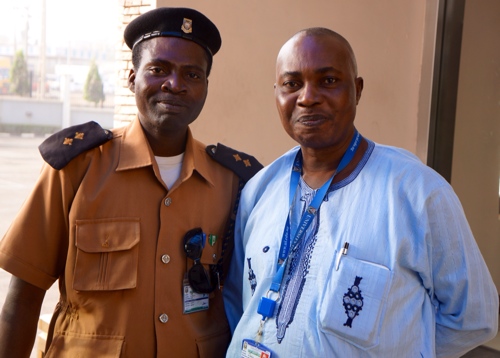
En route with Funmi we are able to discuss a range of topics, ask her about things that may have been unclear to us, and explore new topics. The slight bow/bend of the knee that we see frequently is a sign of respect from a younger person to an older person (regardless of gender; “age trumps gender,” Funmi says, and we applaud). The money passed out liberally at parties is part of the compensation for servers and performers (like tips) and a way of defraying the costs of the affair, when given to hosts. Funmi sees a sign of hope in the troubled Northeast. The newly elected emir was a former treasury secretary and an outspoken critic of corruption. In fact, he did a terrific TED talk. Anyone interested can email me and I’ll find it for you. He is effectively the king of Cano, the second largest city in Nigeria. A sign of the incredible connectedness of the Olopades is that recently they met the emir at a big birthday party, because he was and old school friend of Ayo’s (the groom) father.
We head to CRIN, Cocoa Research Institute of Nigeria, a government-funded institute that actually deals not only with cocoa, but also coffee, kola, cashew nuts, and tea. They do extensive research on all of these crops, seeking ways to improve them. The Kipharts have indicated some interest in possibly investing in cocoa and the Olopades, when they came in August (on the trip that we and the Kipharts were to have joined them on) did quite a bit to explore potential cocoa investment possibilities, particularly in Ekiti State, which we had visited in August, 2013.
The meeting with four CRIN scientists lasted about an hour during which they explained their operations and answered questions. Dick pretty clearly was not impressed with them as a possible investment partner. We then went out to the nursery to see the cocoa plants and the grafting process which has created hybrids that greatly out perform other varieties. Seeing is a good deal more fun than listening, especially when the difficulties of deciphering accents are compounded by the noise of construction outside.
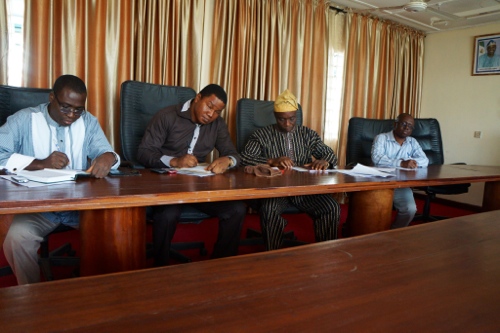
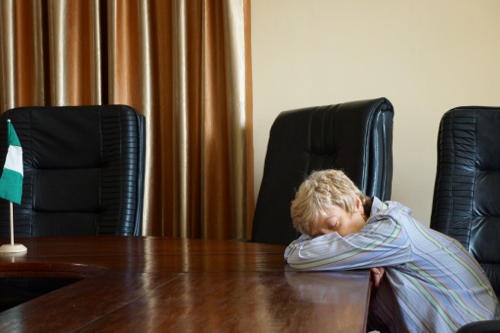
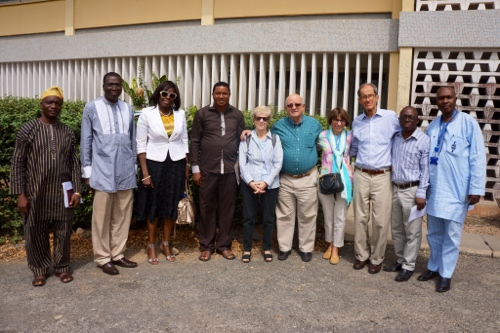
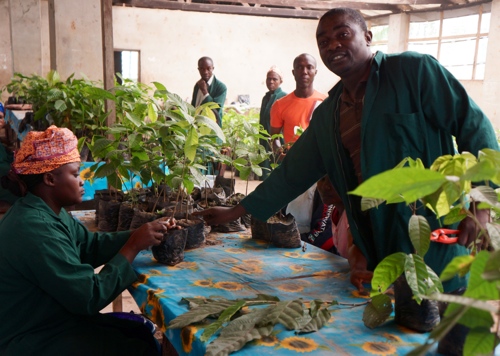
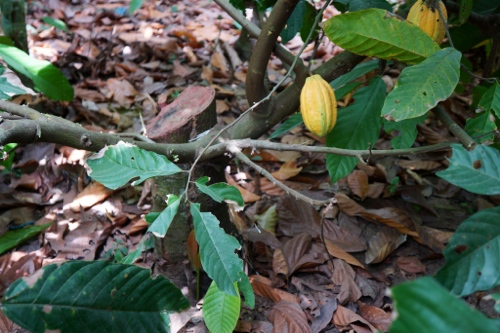
We headed out on the long, bumpy and dusty ride to the Lagos airport. For quite some time, there is heavy traffic, causing vehicles to form not one, but two, lines on the shoulder of the road jockeying for position both with other shoulder riders and with traffic on the main road, which vehicles enter and leave whenever there’s a perceived gain of a couple car lengths in doing so. The scenery on the side of the road is not uninteresting, composed of commercial areas, large gatherings of trucks and animals. Vendors risk their lives wandering in the midst of passing traffic, trying to sell drinks, food, gum and all manner of other things.


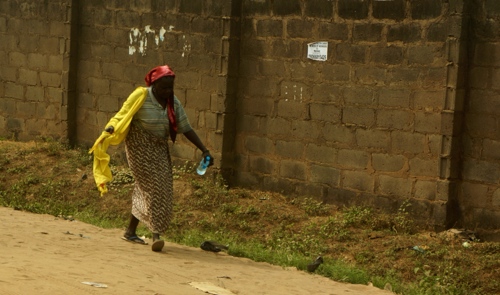

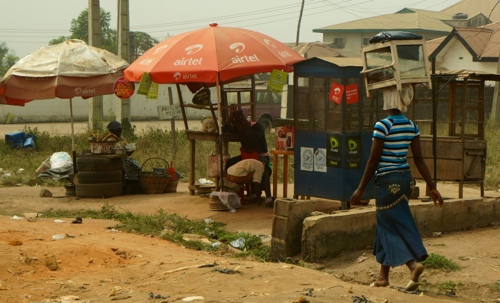
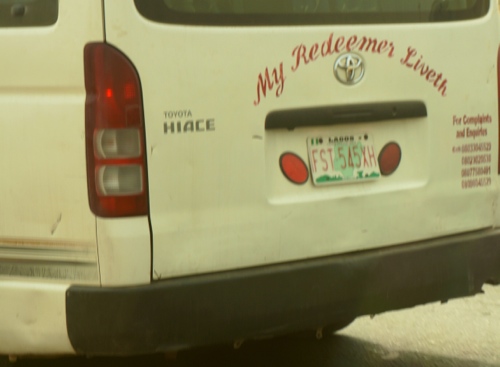
We reach the airport a bit over an hour before scheduled flight time and find the international terminal very uncrowded, as most international flights leave late in the evening. More to the point, the Olopades rule the Lagos airport, getting us quickly through baggage inspection, getting the check-in people to allow us extra bags without cost, convincing an inspector to allow Susie to take on a glass container that they had nixed, getting an airport employee to inform us in a lounge we occupy when the flight is ready and arranging for us to skirt the line at the gate. We have drinks and a snack in a new public lounge, then board the flight, which is about an hour and a half late.
The flight to Accra, the capital of a Ghana is less than an hour. We’re met at the airport by Daniel Kwarteng, the son of Joe (and Ida) Kwarteng, Dicks partner in the pineapple farm we will visit tomorrow. We’re greeted very warmly by Daniel, who we’ve met several times before. Going to Ghana is very much like coming home to us now.
We ride with Susie in a very comfortable car, driven by a young man named Sammy. Daniel drives Dick and the Olopades in a separate vehicle. We’ve decided to drive a couple hours tonight in order to be able to get an early start at the pineapple farm tomorrow and to be closer to Kumasi. En route, we pass a huge brand new shopping mall that opened a couple of months ago. I’m afraid to ask what stores populate it. At the same time, we see hundreds of young people walking the center line on the highway at night trying to hawk their wares, clearly at great risk to their lives.
Our two-hour drive takes three hours. The hotel appears perfectly fine, except that the wifi they have doesn’t work, so I won’t be able to post this blog or check emails. I was intending to have just a beer for dinner, but the buffet dinner which includes rice, vegetables in a nice sauce and prawns is good enough to go back for more. Joe Kwarteng is there with 8 or 10 of the people who work on the pineapple farm. The latter give an update on what’s going on there, but because of poor acoustics, generally bad hearing and Ghanaian accents, which differ from the Nigerian accents we’ve acclimated some to, I only get about half of it. Up to bed by 11.

Leave a Reply